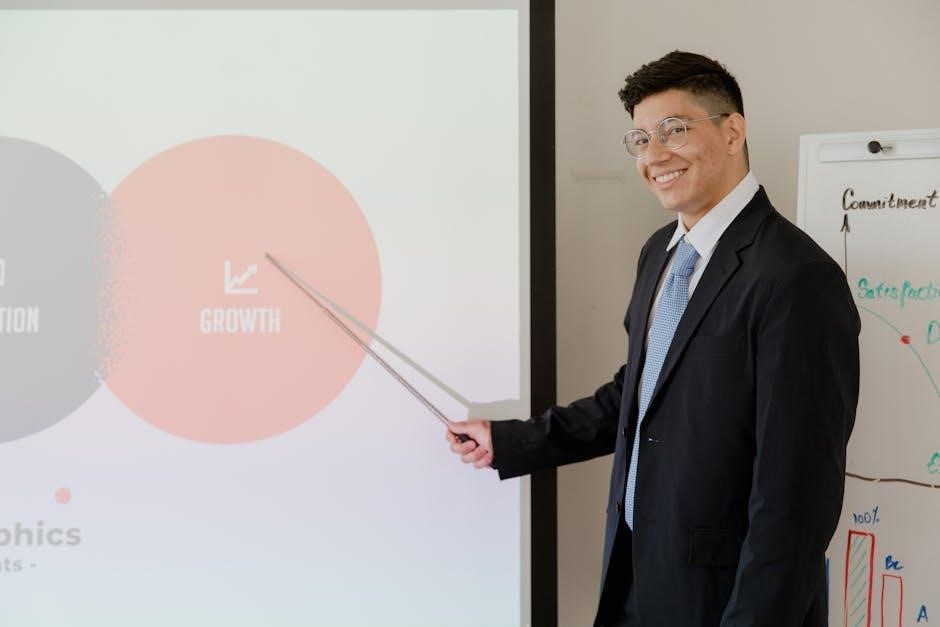Developing the Leader Within You by John C. Maxwell is a transformative guide to unlocking leadership potential. It emphasizes leadership as influence, self-discipline, and vision, empowering readers to grow into effective leaders through practical principles and timeless wisdom.
Overview of John C. Maxwell’s Leadership Philosophy
John C. Maxwell’s leadership philosophy revolves around empowering individuals to unlock their potential and influence others positively. He believes leadership is not about titles but about inspiring and impacting people; Maxwell emphasizes that leadership can be learned and developed through intentional growth, self-discipline, and a clear vision. His approach integrates biblical principles with practical wisdom, making it accessible to leaders in all walks of life. Maxwell’s philosophy also highlights the importance of integrity, prioritization, and people development, asserting that a leader’s greatness is measured by their ability to empower others. His teachings encourage leaders to focus on long-term impact and foster a culture of continuous learning and improvement.
The Importance of Self-Development in Leadership
John C. Maxwell underscores the importance of self-development as the foundation of effective leadership. He argues that leaders must continually grow and improve to inspire and empower others. Maxwell emphasizes that leadership is not innate but developed through intentional effort, such as cultivating a positive attitude, practicing self-discipline, and refining vision. By focusing on personal growth, leaders can enhance their influence, decision-making, and ability to motivate teams. Maxwell encourages leaders to prioritize self-development, as it directly impacts their ability to lead with integrity and purpose. He provides practical steps, such as setting priorities and anticipating challenges, to help leaders continuously improve and become the best version of themselves.
How to Cultivate Influence and Impact
Cultivating influence and impact begins with understanding that leadership is about empowering others. John C. Maxwell emphasizes that true influence grows when leaders focus on helping people grow personally and professionally. By systematically mentoring and teaching, leaders can inspire others to achieve their potential. Maxwell also highlights the importance of living with integrity, as trust is the foundation of influence. Leaders must communicate a clear vision and demonstrate self-discipline, setting an example for others to follow. By prioritizing people development and maintaining a positive attitude, leaders can create lasting impact and foster a culture of growth within their organizations. This approach ensures that their influence extends beyond their immediate team, shaping the broader vision of the organization.

Foundational Principles of Leadership
Leadership begins with influence, vision, and integrity, as John C. Maxwell teaches. These principles form the bedrock of effective leadership, guiding leaders to inspire and empower others.
Leadership as Influence: The Core Concept
Leadership is fundamentally about influence, the ability to inspire and impact others. John C. Maxwell emphasizes that leadership is not confined to formal roles or titles but is accessible to anyone willing to develop this skill. By fostering trust, empathy, and clarity, leaders can influence others to achieve shared goals. Maxwell argues that true leadership is measured by one’s ability to empower others, creating a ripple effect of positive change. This core concept underscores the idea that leadership is not about personal gain but about uplifting and guiding others to reach their full potential.
The Role of Attitude in Leadership

Attitude plays a pivotal role in leadership, shaping a leader’s effectiveness and the culture they foster. John C. Maxwell highlights that a positive attitude is essential for inspiring and motivating others. Leaders with the right mindset approach challenges with optimism, resilience, and a growth-oriented perspective. A leader’s attitude influences their decision-making, problem-solving, and ability to connect with their team; Maxwell emphasizes that a positive attitude not only enhances personal credibility but also creates a conducive environment for collaboration and innovation. By cultivating a proactive and solution-focused mindset, leaders can inspire confidence and drive their teams toward achieving shared objectives. Attitude, therefore, is a cornerstone of effective leadership, empowering leaders to navigate complexities and foster a culture of success.
Understanding Priorities and Decision-Making
Effective leadership hinges on understanding priorities and making sound decisions. John C. Maxwell emphasizes that leaders must master the art of prioritization to align actions with their vision and values. Decision-making is not just about choosing between options but about selecting those that drive progress and inspire others. Maxwell teaches that leaders should focus on tasks that yield the greatest impact, avoiding distractions that dilute their efforts. By setting clear priorities, leaders create clarity for their teams, ensuring everyone works toward common goals. Maxwell also stresses the importance of evaluating decisions based on their long-term consequences, fostering a culture of accountability and intentional growth. This approach enables leaders to lead with purpose and confidence, driving their organizations forward.
Integrity: The Indispensable Quality of Leaders
Integrity is the cornerstone of effective leadership, as emphasized by John C. Maxwell in Developing the Leader Within You. It is the foundation upon which trust and credibility are built, enabling leaders to inspire loyalty and confidence in their teams. Without integrity, even the most skilled leaders cannot sustain long-term success. Maxwell underscores that integrity is about consistency between words and actions, ensuring ethical behavior in all situations. Leaders with integrity lead by example, fostering a culture of honesty and transparency. This quality not only strengthens relationships but also creates a resilient organizational framework. Maxwell argues that integrity is non-negotiable for leaders who aspire to make a lasting, positive impact. It is the essence of who they are, shaping their decisions and legacy.

Key Leadership Lessons from the Book
Developing the Leader Within You offers timeless wisdom on cultivating influence, vision, and self-discipline. It emphasizes empowering others and building integrity, providing practical steps for lasting leadership growth.
Chapter 1: The Power of Positive Influence
In Chapter 1: The Power of Positive Influence, John Maxwell emphasizes that leadership is fundamentally about influence. He explains that the ability to positively impact and inspire others is the cornerstone of effective leadership. Maxwell highlights how influence is not about titles or authority but about empowering others to achieve their potential. He provides practical insights into how leaders can cultivate this influence through their attitudes, actions, and relationships. By focusing on trust, communication, and authenticity, leaders can create a ripple effect of positive change. This chapter underscores the idea that true leadership is measured by the difference it makes in the lives of others, encouraging readers to embrace their role as influencers in their spheres of impact.
Chapter 2: Developing Your Most Appreciable Asset – People
In Chapter 2: Developing Your Most Appreciable Asset – People, John Maxwell highlights the importance of investing in others as the cornerstone of effective leadership. He emphasizes that people are a leader’s most valuable resource and that empowering them is essential for organizational success. Maxwell introduces the concept of the five levels of leadership, with a focus on Level 4, People Development, where leaders systematically mentor and teach their team members. He stresses that true leadership is not about personal achievement but about helping others grow. By prioritizing people development, leaders can create a culture of trust, growth, and shared vision, ultimately fostering a team that is empowered to achieve greatness together.
Chapter 3: The Indispensable Quality of Vision
Chapter 3: The Indispensable Quality of Vision underscores the critical role of vision in effective leadership. Maxwell argues that vision is the hallmark of great leaders, enabling them to see beyond the present and guide their team toward a shared future. He emphasizes that vision provides clarity, direction, and purpose, inspiring others to align with a common goal. Maxwell stresses that leaders must not only possess vision but also communicate it clearly to their team. Visionary leaders are proactive, anticipating challenges and opportunities, and empowering their people to work toward a meaningful purpose. By cultivating and sharing vision, leaders create a roadmap for success, fostering unity and momentum within their organization.
Chapter 4: Self-Discipline – The Price Tag of Leadership
Chapter 4: Self-Discipline – The Price Tag of Leadership highlights self-discipline as a cornerstone of effective leadership. Maxwell emphasizes that self-discipline is not optional but a necessity for leaders who aspire to achieve lasting impact. He explains that self-discipline is about making intentional choices, prioritizing responsibilities, and maintaining accountability, even when it’s challenging. Leaders with self-discipline inspire trust and credibility, as they consistently demonstrate reliability and focus. Maxwell argues that undisciplined leaders struggle to build strong teams or achieve long-term success. By cultivating self-discipline, leaders set the standard for their organization, fostering a culture of accountability and integrity; Self-discipline, Maxwell asserts, is the foundation upon which all other leadership qualities are built, enabling leaders to lead by example and achieve their vision.
Chapter 5: Staff Development – The Most Important Lesson
Chapter 5: Staff Development – The Most Important Lesson underscores the importance of investing in people as a leader. Maxwell argues that developing others is not just a responsibility but a critical factor in achieving organizational success. He emphasizes that true leadership is measured by the ability to empower and grow team members, creating a legacy beyond individual achievement. Maxwell provides practical insights into systematic mentorship, teaching, and creating an environment where people can thrive. By prioritizing staff development, leaders build trust, loyalty, and a strong foundation for future growth. This chapter highlights that developing people is the ultimate mark of a leader’s maturity and the key to sustainable impact.

Developing Vision and Self-Discipline
Developing Vision and Self-Discipline is crucial for effective leadership. Vision guides direction, while self-discipline ensures consistent action and accountability, enabling leaders to achieve their goals and inspire others.
How to Create and Communicate a Clear Vision
Creating and communicating a clear vision begins with understanding your purpose and values, reflecting on your organization’s strengths, and shaping a realistic, achievable direction. Effective communication involves systematically sharing the vision through various channels like meetings, updates, and discussions. Connecting the vision to individual growth enhances commitment, while leading with integrity and consistency builds trust. Maintaining discipline ensures focus and progress toward goals, with regular assessments to stay aligned with the vision.

Building Self-Discipline for Effective Leadership
Self-discipline is the cornerstone of effective leadership, enabling leaders to prioritize tasks, maintain focus, and make consistent decisions; John C. Maxwell emphasizes that disciplined leaders inspire trust and credibility, fostering a culture of accountability. To build self-discipline, leaders must establish clear priorities, avoid distractions, and commit to personal growth. Maxwell advocates for setting boundaries, practicing self-control, and staying aligned with long-term goals. By cultivating self-discipline, leaders demonstrate integrity, resilience, and the ability to guide their teams through challenges. This foundation of self-discipline ensures sustainable success and strengthens both personal and organizational growth.

Empowering Others: A Leader’s Responsibility
Empowering others is a leader’s fundamental duty, fostering growth and confidence. By mentoring, teaching, and delegating, leaders unlock their team’s potential, equipping them to succeed and lead effectively.

People Development: The Heart of Leadership
People development is the cornerstone of effective leadership, as it empowers individuals to grow personally and professionally. Leaders who invest in their team members create a culture of trust, loyalty, and shared success. By systematically mentoring, teaching, and equipping others, leaders unlock their team’s potential, fostering confidence and competence. This approach not only strengthens the organization but also ensures a lasting legacy of growth and empowerment. John Maxwell emphasizes that developing people is not just a responsibility but a vital investment in the future, as great leaders prioritize helping others thrive and succeed.
Systematic Mentorship and Teaching
Systematic mentorship and teaching are essential tools for leadership development, enabling leaders to pass on knowledge, skills, and experiences to others. John Maxwell emphasizes the importance of intentional efforts to equip and empower team members, fostering a culture of growth and continuous improvement. By systematically mentoring, leaders align their team’s goals with the organization’s vision, ensuring everyone works toward common objectives. This approach not only enhances individual capabilities but also strengthens the collective impact of the team. Maxwell highlights that leadership is not just about holding a title but about helping others grow, making mentorship a cornerstone of effective leadership. Through systematic teaching, leaders create a lasting legacy of empowerment and success.

Practical Steps for Leadership Growth
Developing the Leader Within You outlines actionable steps for leadership growth, including setting priorities, living with integrity, and cultivating influence to inspire and impact others effectively.
Preparing for Leadership Challenges
Preparing for leadership challenges involves cultivating self-discipline, maintaining integrity, and fostering a clear vision. Maxwell emphasizes the importance of anticipating problems and reacting proactively. Leaders must prioritize personal growth, embrace continuous learning, and inspire others through positive influence. By systematically mentoring and teaching, leaders empower their teams to overcome obstacles. Effective preparation also includes living with integrity, as trust is the foundation of strong leadership. Maxwell advises leaders to plan ahead while staying present, ensuring they are ready to adapt and lead through challenges. This mindset enables leaders to build resilience and drive organizational success, making a lasting impact on their teams and communities.
Planning Ahead and Living in the Moment
Planning ahead and living in the moment are essential skills for effective leadership. Maxwell emphasizes the importance of having a clear vision for the future while staying grounded in the present. Leaders must anticipate challenges, set priorities, and prepare for opportunities. Living in the moment allows leaders to connect with their team, make informed decisions, and adapt to changing circumstances. By balancing foresight with flexibility, leaders can inspire trust and stability. Maxwell encourages leaders to embrace this duality, ensuring they are both proactive in their planning and fully engaged in the current realities of their organization. This approach fosters resilience and enables leaders to guide their teams toward long-term success while addressing immediate needs.
Proactive Problem Anticipation and Reaction
Proactive problem anticipation and reaction are critical for effective leadership. Maxwell stresses the importance of preparing for challenges before they arise and responding swiftly when they occur. Leaders must anticipate potential issues, gather information, and develop contingency plans. This proactive approach minimizes risks and ensures stability. Additionally, leaders should remain adaptable, ready to adjust their strategies as circumstances change. By anticipating problems and reacting decisively, leaders build trust and confidence within their teams. Maxwell encourages leaders to embrace a mindset of preparedness and agility, enabling them to navigate challenges with confidence and guide their organizations toward success. This balance of foresight and responsiveness is a hallmark of strong leadership.

The Impact of Leadership
Leadership profoundly shapes organizational success by inspiring teams, driving progress, and fostering growth. Effective leaders create lasting change, influencing both individuals and organizations to achieve their full potential.
How Leadership Shapes Organizational Success
Leadership is the cornerstone of organizational success, driving culture, alignment, and progress. Effective leaders inspire vision, empower teams, and foster innovation, ensuring alignment with goals. They cultivate trust and accountability, creating an environment where employees thrive. Strong leadership enhances decision-making, problem-solving, and adaptability, enabling organizations to navigate challenges and capitalize on opportunities. By prioritizing people development and integrity, leaders build a sustainable foundation for growth. Ultimately, leadership transforms individuals and organizations, turning vision into reality and achieving lasting impact. Maxwell emphasizes that leadership is not about power but about empowering others to reach their potential, ensuring organizational success and legacy.
Inspiring and Motivating Teams
Leadership plays a vital role in inspiring and motivating teams by fostering a culture of empowerment and growth. Effective leaders communicate a clear vision, aligning team goals with organizational purpose. They lead by example, demonstrating integrity and enthusiasm, which energizes others. By investing in people development, leaders help team members grow personally and professionally, boosting morale and engagement. Recognizing achievements and providing constructive feedback creates a positive environment where individuals feel valued. Maxwell emphasizes that inspiring leaders empower others to take ownership, fostering a mindset of collaboration and innovation. When teams are motivated and aligned, they achieve extraordinary results, driving organizational success and creating a lasting impact.
Developing the Leader Within You concludes with a call to action, encouraging readers to apply leadership principles daily. Continuous growth, reflection, and intentional practice are essential for lasting impact.
Applying Leadership Principles in Daily Life
Applying leadership principles in daily life is about consistently demonstrating influence and empowering others. Maxwell emphasizes that leadership is not confined to formal roles but is a mindset; By practicing self-discipline, maintaining a positive attitude, and prioritizing growth, individuals can lead effectively in all areas of life. Developing a clear vision and communicating it with passion inspires others to follow. Regular reflection and intentional actions help integrate leadership values into everyday interactions. Continuous learning and mentorship further reinforce these principles, enabling individuals to make a lasting impact. Ultimately, applying these principles fosters personal and organizational success, creating a culture of empowerment and positive change.
Continuous Growth and Development
Continuous growth and development are essential for sustaining and enhancing leadership effectiveness. John Maxwell emphasizes that leadership is a lifelong journey, requiring constant learning, self-assessment, and improvement. By embracing a growth mindset, leaders can adapt to changing circumstances and maximize their potential. Regularly seeking feedback, engaging in mentorship, and applying proven principles ensures ongoing development. Maxwell encourages leaders to stay curious, remain teachable, and consistently invest in their personal and professional evolution. Through dedication to growth, leaders can inspire others, drive innovation, and create lasting impact. This commitment to development not only benefits individuals but also elevates their teams and organizations, fostering a culture of continuous improvement and shared success.